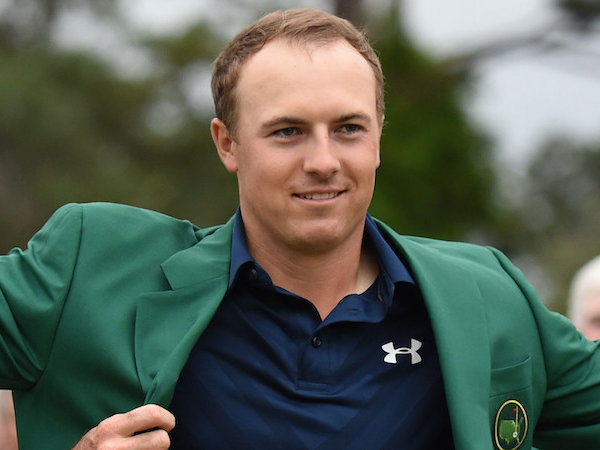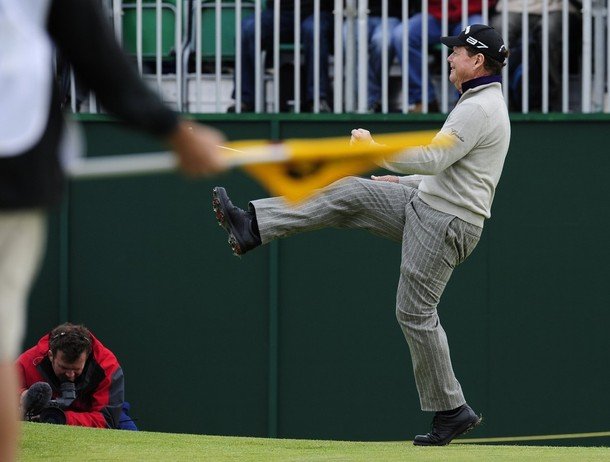The British Open golf tournament, called The Open, by those in the know, kicks off Thursday and the question on everybody’s mind is whether Jordan Spieth can win and come one step closer to winning the Grand Slam of golf.
Ladbrokes, the famed British oddsmaker, puts Spieth a heavy favorite at 6-1, well ahead of the odds for second place Dustin Johnson, who is 12-1.
The modern grand slam has never been won. In order to do so a golfer must win the Masters, U. S. Open, British Open and PGA, which this year is being held at Whistling Straits in Haven, just outside Kohler.
Tiger Woods had the so-called "Tiger Slam" when he held all four titles, but not in the same year. Woods, Jack Nicklaus and Arnold Palmer are the only three golfers to win the first two tournaments, though all failed on leg three of the modern Grand Slam.
The story of the Grand Slam is an interesting one, and I heard it from the horse’s mouth.
I covered my first Master’s golf tournament in 1980. On Tuesday night I found myself in a bar with a veritable who’s who of the golf world. Pat Summerall and Tom Brookshier (the lead announcers for the CBS telecast) were there. So was Dan Jenkins, the humorist golf writer for Sports Illustrated (he taught me the joys of drinking scotch and milk). Frank Chirkinian, the CBS director and the man credited with creating golf on television, was present, as was Dudley Doust of The Sunday Times in London, perhaps the greatest golf writer of the time.
And finally there was a monstrous, loud, hatched faced guy named Bob Drum.
Drum was a former writer for the Pittsburgh Press and many years earlier he had befriended a high school golfer from nearby Latrobe, Pa., named Arnold Palmer.
I was there with a friend named John McGowan, a the sports information director at Marquette when Al McGuire was coach. McGowan was my entry into this group and as the cocktails roared along at a racing pace, Doust asked Drum to tell the story of the creation of the Grand Slam.
It was 1960 and Palmer had just won U.S. Open by two shots over, among others, a young amateur named Jack Nicklaus. He and Drum were on a plane flying to St. Andrews for the British Open.
On the flight, as Drum told the story, Palmer lamented that he couldn’t play the British and American amateur tournaments to win the Grand Slam.
"That’s when I told him we could create a new grand slam,"Drum shouted. "The Masters, U.S. Open, British and the PGA. We could call that the modern Grand Slam."
Drum wrote a column about it and buttonholed everybody he could find in Scotland to push the idea. Everyone, it seemed, loved it and the modern day Grand Slam was born.
That year, Palmer finished second by one stroke, so the hope for the modern Grand Slam that year faded away. Little did anyone know how difficult it would be to win it.
Drum was a much better center of attention, hosting the world on someone else’s dime, but he did leave the world one important memory.
He created the Grand Slam, a phrase that’s on everybody’s lips this week as Spieth tries to become the first to ever do it.
With a history in Milwaukee stretching back decades, Dave tries to bring a unique perspective to his writing, whether it's sports, politics, theater or any other issue.
He's seen Milwaukee grow, suffer pangs of growth, strive for success and has been involved in many efforts to both shape and re-shape the city. He's a happy man, now that he's quit playing golf, and enjoys music, his children and grandchildren and the myriad of sports in this state. He loves great food and hates bullies and people who think they are smarter than everyone else.
This whole Internet thing continues to baffle him, but he's willing to play the game as long as OnMilwaukee.com keeps lending him a helping hand. He is constantly amazed that just a few dedicated people can provide so much news and information to a hungry public.
Despite some opinions to the contrary, Dave likes most stuff. But he is a skeptic who constantly wonders about the world around him. So many questions, so few answers.





